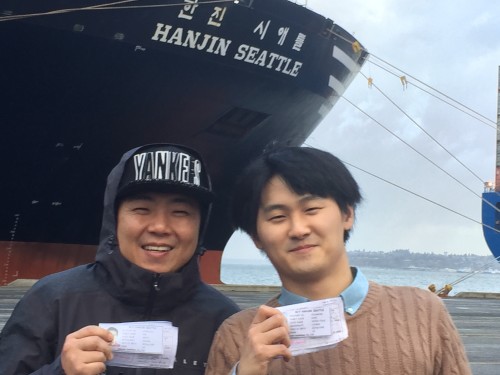
Chinese crew members from the Hanjin Seattle celebrate their shore leave. Customs officials changed their policy after solidarity efforts from the ILWU and support from lawmakers in Washington.
Crewmembers on foreign flagged vessels arriving at West Coast ports have frequently sought help from ILWU members and International Transport Workers’ Federation (ITF) inspectors.
“Sometimes we discover that crew members haven’t been paid correctly, or other times they report abusive working conditions, but sometimes it comes down to respecting their right to shore leave after working weeks or months at sea,” said ITF Coordinator Jeff Engels in Seattle.
This history of helping seafarers explains how a brief, spontaneous solidarity action by ILWU members at the Port of Seattle on the evening of September 26, helped crewmembers aboard the Hanjin vessel Marine who were denied shore leave by officials at U.S. Customs and Border Protection (CBP).
Spontaneous solidarity
“The solidarity action on September 26 was a spontaneous response by ILWU members who saw the frustration of those crew members who were locked aboard their ship for several weeks,” said Local 19 President Rich Austin, Jr.
ILWU members responded quickly to the sight of crewmembers aboard the Marine who dangled a homemade banner emblazoned with the words, “We deserve shore leave” and “Thank you ILWU.” Dozens of ILWU members who were working on the Seattle dock briefly cheered for the crew and blew horns on vehicles that were operating alongside the container vessel around 6pm.
Support from ITF officials
The solidarity action won praise from leaders of the International Transport Workers’ Federation (ITF), who said the refusal to grant shore leave to seafarers on Hanjin ships calling at U.S. ports amounted to a denial of human rights.
ITF First Vice Chair and ILWU Vice President (Mainland) Ray Familathe said, “Preventing these seafarers from going ashore denies them a basic right, especially after they’ve been on a ship for weeks or months.” Familathe said the ILWU urged the U.S. Customs and Border Protection to review decisions made by some regional officials who enacted the lockdown against seafarers.
Tradition of solidarity
The ILWU was founded on a tradition of solidarity for all workers, especially those in the maritime industry.
Sailors had already organized unions aboard vessels long before dockworkers succeeded in doing so. In 1934, longshore workers were day-laborers without rights and subject to terrible abuse.
The West Coast Waterfront Strike in the summer of 1934 sought to improve conditions for all maritime workers, including seafarers as well and longshore workers.
“The ILWU’s history is based on solidarity and when we say an injury to one is an injury to all, we mean it,” said ILWU International President Bob McEllrath who added, “all of us have a responsibility to keep that tradition alive.”
